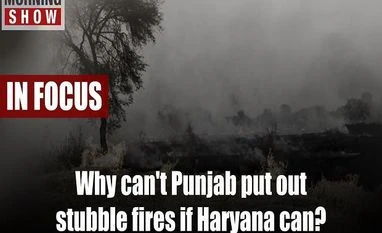Why can't Punjab put out stubble fires? What does Douglas Diamond think of dominance of PSBs? Is geopolitics a big worry for markets? Why RBI has to write to the govt over inflation? Answers here
Winter is no more pleasant in north India. One after another, fields of Punjab, Haryana and western UP are erupting in fire, and turning pitch-black. Smoke and ashes emanating from them are engulfing the entire Delhi and surrounding region. For over two months, farmers continue to set paddy straw on fire with impunity -- unperturbed by government warnings and schemes. On Wednesday, Punjab recorded over 3,600 incidents of farm fires. And the next day, Delhi’s AQI reached hazardous levels. Punjab’s share in farm fires is maximum this time. So why has the government failed in reining in the stubble burning in the state?
The impact of air pollution is as devastating on our economy as it is on our health. According to a study, it costs Indian businesses around Rs 7 lakh crore every year. Moving on, a haze of uncertainty has enveloped the global economy. No one knows what lies next. So how can banks brace themselves amidst global concerns about a possible recession in 2023? Are fintechs making banks less relevant? And is the dominance of public sector banks healthy? My colleague. Manojit Saha, and I spoke with Professor Douglas Diamond, who won the 2022 Nobel Prize in Economics, for the answers. . The Nobel was awarded to Diamond along with long time collaborator, Philip Dybvig, and former Federal Reserve chair, Ben Bernanke for having “significantly improved our understanding of the role of banks in the economy, particularly during financial crises”.
Rising interest rate and liquidity withdrawal continue to put pressure on global equity markets. And after the Russia-Ukraine war, fresh geo-political tensions are seen brewing in some other regions too. So, will these global worries affect markets globally? And are they a bigger worry than central bank policy action?
The Reserve Bank of India’s monetary policy committee held an off-cycle meeting on Thursday. It was called to discuss the unrelenting inflation and give a response to the government on it. In in this episode of the podcast we tell you why the RBI is writing to the government over inflation.
)